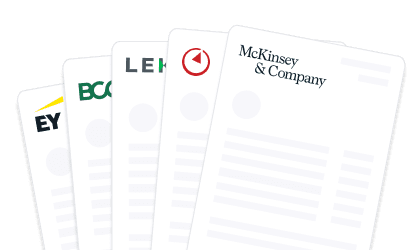Mastering Consulting Cases: A Step-by-Step Approach
If you're looking to become a successful consultant, mastering consulting cases is a must.
Posted June 13, 2025

Join a free event
Learn from top coaches and industry experts in live, interactive sessions you can join for free.
Table of Contents
If you're looking to join the consulting industry or looking to move up in the ranks, you will probably have to go through a consulting case interview. Consulting firms use case interviews to assess potential hires, test their analytical and problem-solving skills, and evaluate their communication and presentation abilities. However, as daunting as these interviews might seem, with proper preparation, they can be mastered. In this guide, we'll explore a step-by-step approach to help you hone your consulting case interview skills and come out confident and successful.
Why Consulting Cases are Important for Your Career
Case interviews have become an industry standard for consulting firms when evaluating potential hires. Consulting cases offer insight into how an applicant approaches problem solving, and how they can apply structured thinking and analytical skills to real-world business scenarios. For the applicant, nailing the case interview is often the difference between getting hired or not. Firms want individuals who can think on their feet and articulate solutions effectively while working under pressure. Consulting interviews are an opportunity to showcase these skills and demonstrate that you have what it takes to tackle complex business problems.
Moreover, consulting cases provide a unique opportunity for candidates to learn about the consulting industry and the types of projects they may work on. Through the case interview process, candidates can gain exposure to various industries and business problems, which can help them determine if consulting is the right career path for them. Additionally, the feedback provided by interviewers after the case interview can be invaluable in helping candidates identify areas for improvement and develop their problem-solving skills further.
Finally, mastering consulting cases can also benefit candidates in their future careers, even if they do not end up pursuing consulting. The structured problem-solving approach and analytical skills developed through case interviews are highly transferable and can be applied to a wide range of industries and roles. These skills are highly valued by employers and can help candidates stand out in a competitive job market.
Understanding the Basics of Consulting Cases
Before we dive into the specifics of case interviews, it's important to understand their basic structure. Case interviews usually start with a general business problem presented by the interviewer. This could include anything from market entry strategies to pricing optimization and everything in between. The interviewee will then be asked to break down the problem, identify the underlying issues, and develop a solution. In most cases, the interviewer will give additional information, which requires the interviewee to adjust their hypothesis or do further analysis.
It's important to note that case interviews are not just about finding the right answer, but also about demonstrating your problem-solving skills and ability to think critically under pressure. Interviewees are expected to communicate their thought process clearly and concisely, while also being open to feedback and adjusting their approach as needed. Additionally, it's common for case interviews to involve multiple rounds, with each round building on the previous one and increasing in complexity. Therefore, it's crucial to practice and prepare extensively before going into a consulting case interview.
Developing Your Analytical Skills to Solve Consulting Cases
Consulting cases require a strong analytical mindset. It's essential to develop and practice skills such as problem structuring, data analysis, and hypothesis generation, to excel in case interviews. These skills take time to cultivate, but you can practice using frameworks such as the Porter's Five Forces or the SWOT analysis, which can help you dissect complex business problems. Additionally, practicing mental math and learning how to create a quick estimate can be helpful in interview situations where time is of the essence.
Another important skill to develop is effective communication. As a consultant, you will need to be able to clearly and concisely communicate your findings and recommendations to clients and team members. This includes being able to present complex data in a way that is easy to understand and being able to tailor your communication style to different audiences.
Finally, it's important to stay up-to-date with industry trends and news. This will help you understand the context of the problems you are solving and allow you to provide more informed recommendations. Reading industry publications, attending conferences, and networking with professionals in the field are all great ways to stay informed and continue developing your analytical skills.
Tips for Effective Communication during Consulting Cases
Effective communication is a critical aspect of consulting case interviews. Consulting firms are looking for individuals who can present their findings and recommendations coherently and persuasively. During the interview, it's essential to take time to clarify the problem, understand the interviewer's perspective, and ask questions. Additionally, structuring your approach and presenting your ideas in a concise and logical manner can help you demonstrate your communication skills and show that you can present complex information to clients.
Another important aspect of effective communication during consulting cases is active listening. It's crucial to listen carefully to the interviewer's questions and feedback, as well as to any information provided during the case. This will help you understand the problem better and tailor your approach accordingly. Additionally, active listening can help you build rapport with the interviewer and demonstrate your ability to work collaboratively with clients. Remember to take notes and summarize key points to ensure that you have a clear understanding of the problem and can communicate your findings effectively.
How to Approach the Problem-Solving Process in Consulting Cases
When starting a consulting case interview, it's crucial to have a structured approach to problem solving. A typical approach includes four stages: breaking down the problem, analyzing the data, synthesizing the information, and developing an actionable solution. It's essential to take time to familiarize yourself with this approach, practice it, and adjust it to suit your needs. Using a structured framework also helps the interviewee stay focused under time pressure and demonstrate a structured thinking process.
Another important aspect of the problem-solving process in consulting cases is to ask the right questions. It's crucial to ask clarifying questions to ensure that you fully understand the problem and its context. Additionally, asking insightful questions can help you uncover hidden information and identify potential solutions. However, it's important to strike a balance between asking too many questions and not asking enough. Asking too many questions can waste time and make you appear indecisive, while not asking enough questions can lead to incomplete or inaccurate solutions.
Identifying Key Information and Data Points in Consulting Cases
Data analysis is integral to consulting case interviews. Interviewees should be prepared to handle large amounts of data and be able to analyze it quickly. It's important to identify the key information and data points that support your hypotheses. Additionally, practice identifying data that is missing or incomplete and devise appropriate methods to fill in the gaps. A critical aspect of data analysis is remaining open to changing your hypothesis as new information becomes available and factoring in various assumptions.
A Guide to Structuring Your Thinking in Consulting Cases
Structuring your thoughts is important in consulting case interviews. Interviewees should use a logical, organized, and standardized approach to dissect the problem and develop a solution. Learning and practicing frameworks such as MECE (mutually exclusive, collectively exhaustive) can help interviewees break down complex problems into smaller, more manageable components. Structuring your thinking also helps you eliminate unnecessary information, prioritize key issues, and develop a comprehensive and actionable solution.
Techniques for Prioritizing and Organizing Your Thoughts in Consulting Cases
Consulting cases often involve a vast amount of information, and interviewees must learn to prioritize and organize their thoughts. One technique is to use a clear agenda with a structured approach to analyze the problem and develop the solution. Another technique is to use a brainstorming session to generate ideas, get input from others, and filter out irrelevant information. It's essential to remain focused and prioritize essential information while keeping in mind the bigger picture of the problem.
Strategies for Presenting Your Findings and Recommendations in Consulting Cases
During a consulting case interview, it's necessary to present your findings and recommendations effectively. Presentations should be crisp, clear, and concise, highlighting key findings, actionable recommendations, and potential risks. Additionally, it's essential to back up your recommendations with data and be prepared to defend your solution. Lastly, the interviewer may ask follow-up questions, and it's crucial to be prepared for every possible question that could arise.
Common Mistakes to Avoid During Consulting Case Interviews
Interviewees can make several mistakes during consulting case interviews that could cost them the job. For instance, not answering the question directly, jumping into assumptions without examining underlying data, not identifying key issues, or failing to provide quantitative justification for their solutions. It's essential to be aware of these mistakes and avoid them at all costs.
The Importance of Practice and Preparation in Mastering Consulting Cases
Practice makes perfect in consulting case interviews. It's essential to prepare and practice as many case interviews as possible to become comfortable with the format and types of questions that may arise. Practicing with peers or hiring a coach can also be useful in gaining insights and feedback to improve performance. Additionally, preparing a list of potential questions, researching the firm you're interviewing with, and reviewing the case interview format can all help you improve your chances of success.
Expert Insights from Successful Consultants on Navigating Case Interviews
Getting insights from successful consultants who have navigated the case interview process can be invaluable. They can offer advice and insider tips on what works and what does not. These individuals can shed light on the types of questions to expect, how to structure your approach, and how to think on your feet. It's a good idea to use resources such as online forums, LinkedIn, or professional societies to reach out to consultant professionals who may offer guidance and mentorship.
Resources and Tools to Help You Improve Your Case Interview Skills
Several resources and tools can help you prepare and ace your consulting case interview. These include sample cases and practice questions, consulting interview books, case interview videos, and coaching services. It's essential to use these resources in conjunction with hands-on practice to achieve mastery of the case interview format.
The Future of Consulting: Trends and Innovations to Watch Out For
The consulting industry is constantly evolving, and staying updated on the latest trends and innovations can help you stand out from other candidates. Knowing the latest developments in artificial intelligence, big data, and other emerging technologies can help you bring extra value to consulting firms. It's also essential to stay abreast of industry trends such as increasing focus on social responsibility, sustainability, and diversity and inclusion in the workplace.
In conclusion, mastering consulting cases takes time, effort and practice. The key is to hone your analytical skills, structure your thinking, prioritize data points, practice effective communication, and avoid common mistakes. Staying current on the latest trends and innovations in the consulting industry can also help you stand out from other candidates. With the right preparation, approach, and mindset, you can conquer consulting case interviews and start your career in consulting with confidence.
Browse hundreds of expert coaches
Leland coaches have helped thousands of people achieve their goals. A dedicated mentor can make all the difference.


























